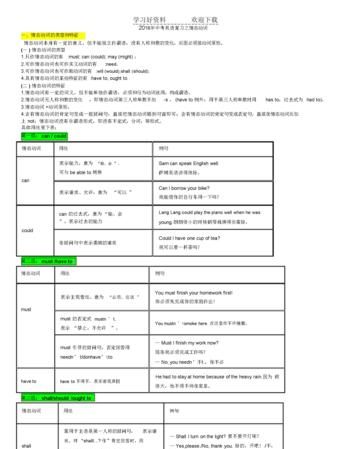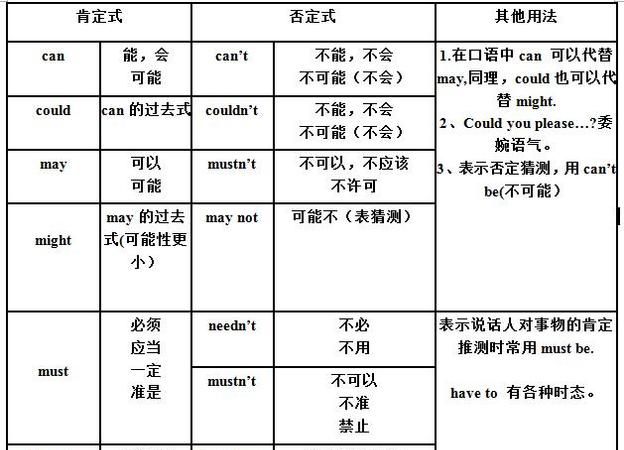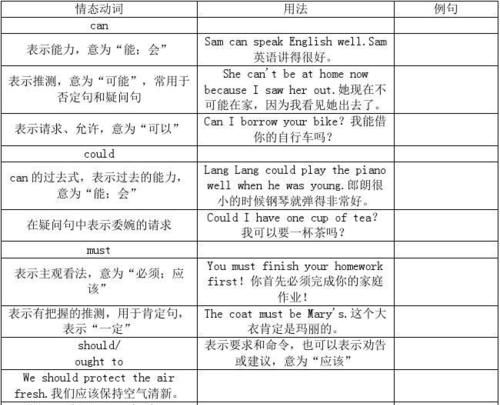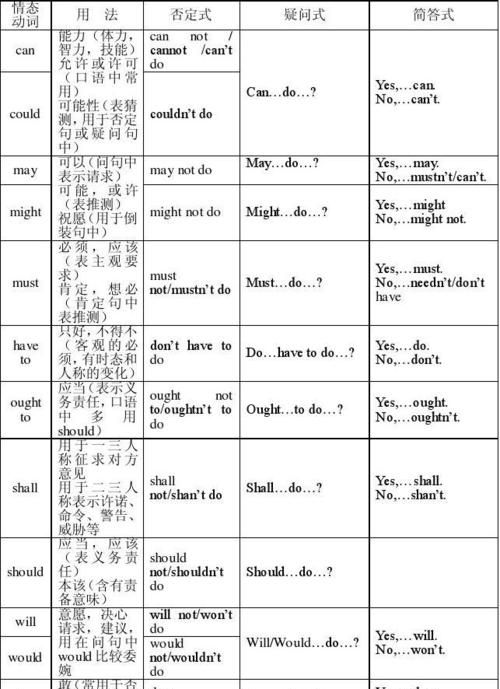本文目录
情态动词表推测的三种句式
情态动词有can (could), may (might), must, have to, shall (should, will (would), dare (dared), need (needed), ought to等。 情态动词无人称和数的变化;不能单独使用,必须与其后的动词原形构成谓语
一、 can, could
1) 表示能力(体力、知识、技能)。
Can you lift this heavy box?(体力)
Mary can speak three languages.(知识)
Can you skate?(技能)
此时可用be able to代替。Can只有一般现在时和一般过去式;而be able to则有更多的时态。
I’ll not be able to come this afternoon.
当表示“经过努力才得以做成功某事”时应用be able to,不能用Can。如:
He was able to go to the party yesterday evening in spite of the heavy rain.
2) 表示请求和允许。
-----Can I go now?
----- Yes, you can. / No, you can’t.
此时可与may互换。在疑问句中还可用could,
might代替,不是过去式,只是语气更委婉,不能用于肯定句和答语中。
---- Could I come to see you tomorrow?
---- Yes, you can. ( No, I’m afraid not. )
3) 表示客观可能性(客观原因形成的能力)。
They’ve changed the timetable, so we can go by bus instead.
This hall can hold 500 people at least.
4) 表示推测(惊讶、怀疑、不相信的态度),用于疑问句、否定句和感叹句中。
Can this be true?
This can’t be done by him.
How can this be true?
二、 may, might
1) 表示请求和允许。might比 may语气更委婉,而不是过去式。否定回答时可用can’t
或mustn’t,表示“不可以,禁止”。
----Might/ May I smoke in this room?
---- No, you mustn’t.
---- May/Might I take this book out of the room?
---- Yes, you can. (No, you can’t / mustn’t. )
用May I...?征徇对方许可时比较正式和客气,而用Can I...?在口语中更常见。
2)用于祈使句,表示祝愿。
May you succeed!
3) 表示推测、可能性(不用于疑问句)。
might不是过去式,它所表示的可能性比may小。
1.He may /might be very busy now.
2.Your mother may /might not know the truth.
三、 must, have to
1) 表示必须、必要。
You must come in time.
在回答引出的问句时,如果是否定的,不能用mustn’t(禁止,不准),而用needn’t, don’t have to(不必).
---- Must we hand in our exercise books today?
---- Yes, you must.
---- No, you don’t have to / you needn’t.
2) must是说话人的主观看法, 而have to则强调客观需要。Must只有一般现在时, have to 有更多的时态形式。
1. he play isn’t interesting, I really must go now.
2. I had to work when I was your age.
3) 表示推测、可能性(只用于肯定的陈述句)
1. You’re Tom’s good friend, so you must know what he likes best.
2. Your mother must be waiting for you now.
四、 dare, need
1) dare作情态动词用时, 常用于疑问句、否定句和条件从句中, 过去式形式为dared。
1. How dare you say I’m unfair?
2. He daren’t speak English before such a crowd, dare he?
3. If we dared not go there that day, we couldn’t get the beautiful flowers.
2) need 作情态动词用时, 常用于疑问句、否定句。在肯定句中一般用must, have to, ought to, should代替。
1.You needn’t come so early.
2. ---- Need I finish the work today?
---- Yes, you must. / No, you needn’t.
3) dare和 need作实义动词用时, 有人称、时态和数的变化。在肯定句中,dare后面常接带to的不定式。在疑问句和否定句中,dare后面可接带to或不带to的不定式。而need后面只能接带to的不定式。
1. I dare to swim across this river.
2. He doesn’t dare (to) answer.
3. He needs to finish his homework today.
五、 shall, should
1) shall 用于第一人称,征求对方的意见。
What shall we do this evening?
2) shall 用于第二、三人称,表示说话人给对方的命令、警告、允诺或威胁。
1. You shall fail if you don’t work hard.(警告)
2. He shall have the book when I finish it.(允诺)
3. He shall be punished.(威胁)
六、 will, would
1) 表示请求、建议等,would更委婉。
Will / Would you pass me the ball, please?
2) 表示意志、愿望和决心。
1. I will never do that again.
2. They asked him if he would go abroad.
3) would表示过去反复发生的动作或某种倾向。would表示过去习惯时比used to正式,且没有“现已无此习惯”的含义。
1. During the vacation, he would visit me every other day.
2. The wound would not heal.
4) 表示估计和猜想。
It would be about ten o’clock when she left home.
七、 should, ought to
1) should, ought to表示“应该”,ought to表示义务或责任,比should语气重。
1. I should help her because she is in trouble.
2. You ought to take care of the baby.
2) 表示劝告、建议和命令。should, ought to可通用,但在疑问句中常用should。
1. You should / ought to go to class right away.
2. Should I open the window?
3) 表示推测
should , ought to (客观推测), must(主观推测)。
1.He must be home by now. (断定他已到家)
2.He ought to/should be home by now.(不太肯定)
3. This is where the oil must be.(直爽)
4. This is where the oil ought to/should be.(含蓄)

情态动词的用法 就是什么提问 什么回答例如:Could提问can回答是不是
你的例子太笼统,要看实际情况来用。情态动词除了ought后面跟不定式之外,其他的和助动词一样,后面接动词原形,从而构成谓语动词。 can可表示能力、客观可能性、允许或者用在疑问、否定、惊叹句中(表示请求、命令、惊异、怀疑等态度)。

need情态动词一般疑问句回答
你确定问的是对一般疑问句的回答?那没有什么特殊的呀,例如:May I go now?-Yes,please./Please don't.
Must I hand in the papers?-Yes,you need./No, you needn't.
你把句子先翻译成中文进行回答,中文怎么回答,你就再用英文怎么回答.
如果是反义疑问句的话,就要注意一些用法了.

总结情态动词的提问和回答
1)客气的请求 (以can/may /will /would 提问) 提问) )
Could I use your telephone?
Yes, you can/ may. ( No, I am afraid not.)
May I swim in the lake?
Yes, you may/can. ( No, you may not. / No, you’d betternot.)
would比will委婉客气。如:
Would you pass me the book?
ok, no problem,
sorry ,I can't
Would you like a cup of tea?
No, thanks.
Yes, please.
2)以must/need提问 ) 提问 Must I finish the homework today?
Yes, youmust. (No, you needn’t. / No, you don’t have to.)
Need I start from the beginning? Yes, you must. ( No, you needn’t. / No, you don’t haveto.)
3)shall 用于第一 三人称,构成疑问句, 第一、 ①用于第一、三人称,构成疑问句 表示征求对 方意见。 方意见。
Shall I turn on the light?
Yes, please.
Shall the messenger wait?
Yes, he shall.

以上就是关于八个情态动词提问及回答 ,情态动词表推测的三种句式的全部内容,以及八个情态动词提问及回答 的相关内容,希望能够帮到您。
